News
Radio Regulations and Global Spectrum management

By Sonny Aragba-Akpore.
From January 1, 2025, a new radio regulation management takes root among the 193-member nations of the International Telecommunications Union (ITU)
This is a fall out of the 2024 resolutions of the ITU Radio Regulations,a result of a four-year process after four weeks of negotiations during the World Radiocommunication Conference (WRC-23), hosted 2023 in Dubai, United Arab Emirates.
The International Telecommunication Union (ITU) released on August 28,2024 an updated version of the Radio Regulations, the international treaty governing the global use of radio-frequency spectrum and satellite orbits.
The ITU Radio Regulations govern the global use of radio-frequency spectrum and satellite orbits for all radio services, systems and applications, including fixed and mobile broadband, satellite systems, sound and TV broadcasting, radionavigation, meteorological monitoring and prediction, space research and Earth exploration, amateur radio services and other topics.
“The 2024 edition of the Radio Regulations marks a significant milestone in the world of technology,” according to ITU Secretary-General Doreen Bogdan-Martin. “As technological progress advances and the demand for spectrum grows, the international treaty continues to evolve to accommodate new radiocommunication services and applications, minimize interference between services, and ensure equitable access to this essential resource.”
The treaty serves as the cornerstone of international radio frequency management, ensuring that spectrum allocations keep pace with the rapidly evolving technological landscape and meet the needs of modern communication systems.
The Radio Regulations are a four-volume treaty of more than 2,000 pages. The treaty establishes the rights and obligations of ITU’s 193 member states and now covers more than 40 different radiocommunication services, spanning frequencies from 8.3 kilohertz (kHz) to 3000 gigahertz (GHz).
The ITU Radio Regulations facilitate equitable access to and rational use of the radio-frequency spectrum and geostationary satellite orbits, both globally shared and limited natural resources; support the efficient and effective operation of all radiocommunication services; and, as necessary, facilitate the introduction and regulation of new radiocommunication services and technologies.
The international coordination mechanisms enshrined in the ITU-managed treaty promote its objective to ensure the availability of the frequencies provided for distress and safety communications and help prevent or resolve cases of harmful interference between the radio services of different administrations.
The 2024 Radio Regulations are available in all six UN official languages These are Arabic, Chinese, English, French, Russian and Spanish.
The correct interpretation and translation of these six languages, in both spoken and written form, is very important to the work of the Organization, because this enables clear and concise communication on issues of global importance.
The ITU said the Radio Regulations documents also available on electronic versions that can be downloaded free of charge while Print and DVD versions will be available for purchase in the coming weeks.
Treaty provisions also direct how radio equipment and systems must operate to ensure efficient and effective coexistence among various services worldwide and anywhere in space, optimizing the usage of today’s increasingly crowded airwaves.
The 2024 Radio Regulations identify new spectrum resources to support technological innovation, deepen global connectivity, increase access to and equitable use of space-based radio resources, and enhance safety at sea, in the air, and on land.
“The updated Radio Regulations is the result of hard-won agreements reached at WRC-23 and a testament to the unwavering spirit of cooperation and compromise among all of our members to negotiate timely changes to the international treaty,” said Mario Maniewicz, Director of the ITU Radiocommunication Bureau. “The updated treaty provides a framework for national spectrum management that aligns with international standards and guarantees the stable, predictable regulatory environment that is essential for the development of innovative radiocommunication services for all.”
Global regulation of the radio spectrum began with the signing of the first International Radio Telegraph Convention in Berlin on November 3,1906 after 30 states came together and agreed on key maritime communications and safety provisions and established “SOS” as a globally recognized distress signal.
The Radio Regulations, Edition of 2024, contains the complete texts of the Radio Regulations adopted by the World Radiocommunication Conference of 1995 (WRC-95) and reviewed by the subsequent World Radiocommunication Conferences: WRC-97 (Geneva, 1997), WRC-2000 (Istanbul, 2000), WRC-03 (Geneva, 2003), WRC-07 (Geneva, 2007), WRC-12 (Geneva, 2012), WRC-15 (Geneva, 2015), WRC-19 (Sharm el-Sheik, 2019) and WRC-23 (Dubai, 2023).
World radiocommunication conferences (WRC) are held every three to four years.
It is the job of WRC to review, and, if necessary, revise the Radio Regulations, the international treaty governing the use of the radio-frequency spectrum and the geostationary-satellite and non-geostationary-satellite orbits. Revisions are made on the basis of an agenda determined by the ITU Council, which takes into account recommendations made by previous world radiocommunication conferences.
The general scope of the agenda of world radiocommunication conferences is established four to six years in advance, with the final agenda set by the ITU Council two years before the conference, with the concurrence of a majority of Member States.
Under the terms of the ITU Constitution, a WRC can:revise the Radio Regulations and any associated Frequency assignment and allotment Plans; address any radiocommunication matter of worldwide character; instruct the Radio Regulations Board and the Radiocommunication Bureau, and review their activities; determine Questions for study by the Radiocommunication Assembly and its Study Groups in preparation for future Radiocommunication Conferences.
On the basis of contributions from administrations, the Radiocommunication Study Groups, and other sources is captured in Article 19 of the Convention (Geneva, 1992)) concerning the regulatory, technical, operational and procedural matters to be considered by World and Regional Radiocommunication Conferences, the Conference Preparatory Meeting (CPM) shall prepare a consolidated report to be used in support of the work of such conferences.
News
Celebrity boxing: Speed Darlington wants rematch after losing to Portable

By Kayode Sanni-Arewa
Nigerian singer Speed Darlington is calling for a rematch against Portable after losing to him in a celebrity boxing match.
Speed Darlington was knocked out in the second round, and he’s unhappy about the outcome.
In a video, he claimed Portable didn’t deserve the win and the prize money, saying he had plans to use the money to build a swimming pool for his community in Imo State.
Portable, I want a rematch. E dey pain me say you dey carry all that money dey go. E dey break my heart.
” I want a rematch. It’s so unfair. You have up to two experience before me and you fight. I never enter ring before. I did not come from poverty,” he said.
“You don’t deserve that money. E dey pain me. I want to build swimming pool for my villagers. I need a rematch, Portable”, he said.
According to Speed Darlington, Portable had an unfair advantage due to his experience, accusing him of using supernatural means to win the fight.
He also claimed he suffered a shoulder injury during the match despite not feeling tired.
Speed Darlington, who wants a rematch, said he needs 30 days to prepare better
News
Israel’s remote controlled bulldozers breaking ground in Gaza war

At first glance, there is nothing unusual about the bulky bulldozer turning up soil at a testing site in central Israel, but as it pulled closer it became clear: the driver’s cabin is eerily empty.
This is the Robdozer, a fortified engineering vehicle manned remotely, and in this case operated from a military expo halfway across the globe in Alabama.
Army engineers and military experts say that the Robdozer — the robotic version of Caterpillar’s D9 bulldozer — is the future of automated combat.
The Israeli military has used D9 for years to carry out frontline tasks like trowelling roads for advancing troops, removing rubble and flattening terrain.
But since war in Gaza broke out in October 2023 and later in Lebanon, the Israeli military has increasingly deployed this robotic version in a bid to enhance its field operations and reduce the risks to its troops.
“The idea is to eliminate the person from the cockpit of the dozer,” said Rani, whose team at the state-owned Israel Aerospace Industries developed the Robdozer.
An unmanned D9 bulldozer digs up a field during a demonstration to the press at the Israel Aerospace Industries (IAI) quarters near Tel Aviv on March 26, 2025. Israel’s increasing use of advanced technology on the battlefield, from air defence systems to a broad range of AI-driven intelligence tools, has been well-documented but also criticised for inaccuracies, lack of human oversight and potential violations of international law. (Photo by GIL COHEN-MAGEN / AFP)
During the Gaza war, the military has increasingly opted for the unmanned version, which can carry out a full range of tasks “even better than a human”, said Rani, using his first name only for security reasons.
While such vehicles and other systems are currently operated by humans, future versions could be autonomous, raising ethical and legal concerns over the unchartered future of warfare being shaped by the Israeli military in the Gaza war.
‘Changing the paradigm’
Israel’s increasing use of advanced technology on the battlefield, from air defence systems to a broad range of AI-driven intelligence tools, has been well-documented but also criticised for inaccuracies, lack of human oversight and potential violations of international law.
Analysts say the growing Israeli deployment of the Robdozer reflects broader global trends towards automation in heavy combat vehicles, like remote-controlled personnel carriers that operate much like drones.
An Israeli military official, who requested anonymity to discuss sensitive matters, told AFP that the army has been using “robotic tools for over a decade, but in very small numbers. Now it is being used in large-scale warfare”.
News
70-hour Chess Marathon: Onakoya reportedly breaks record set by Norwegians

Nigerian chess sensation and founder of Chess in Slums Africa, Tunde Onakoya, has broken the chess marathon record of 61 hours, 3 minutes, and 34 seconds, set by two Norwegian players, Hallvard Haug Flatebø and Sjur Ferkingstad, in June 2024.
Onakoya and his chess partner, Shawn Martinez, are currently aiming to complete a 70-hour chess marathon in Times Square, New York.
The marathon, a four-day non-stop gameplay, started on April 17.
In a post shared on X shortly after surpassing the current record, he expressed fulfillment and called for action to educate and create opportunities for street children in Nigeria.
For all the dreamers! We’ve officially BROKEN THE RECORD with my brother,” he wrote.
Although the official confirmation from Guinness World Records is still being awaited, Nigerians and chess lovers from different parts of the world have congratulated the chess master on his latest achievement.
-
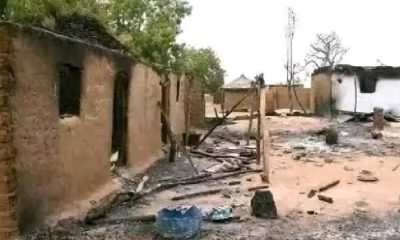
 News20 hours ago
News20 hours agoBLACK EASTER: Over 150 massacred in Plateau, Benue
-
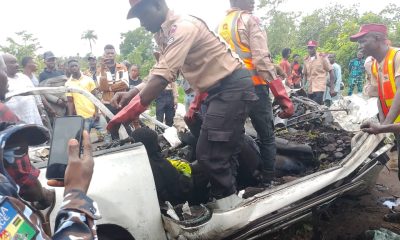
 News16 hours ago
News16 hours agoDouble tragedy: Father, three children, maid killed in Osun road crash
-
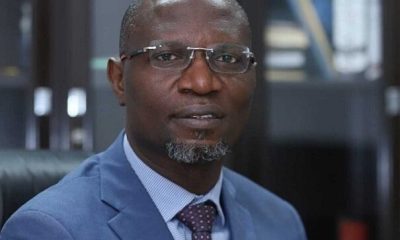
 News15 hours ago
News15 hours agoSAD! SEC DG says “we can’t recover N1.3trn Nigerians lost to CBEX ponzi scheme”
-
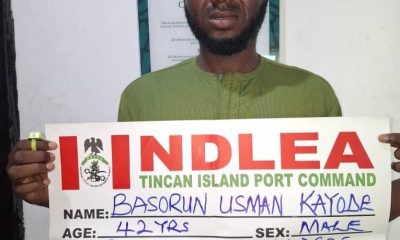
 News13 hours ago
News13 hours agoNDLEA nabs bandits supplier with drugs concealed in private part(Photos)
-
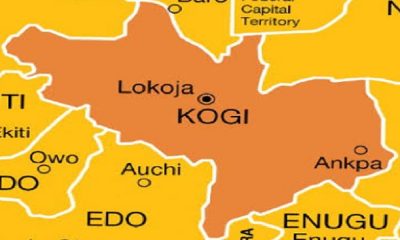
 Metro19 hours ago
Metro19 hours agoShock as 2 naked lovers found dead in Kogi
-

 News19 hours ago
News19 hours agoIMF expresses concern over high poverty rate, food insecurity in Nigeria
-

 Economy20 hours ago
Economy20 hours agoVolvo announces termination of 800 U.S. workers, cites tariff, market decline
-

 News15 hours ago
News15 hours agoNUJ-FCT Chairman Urges Journalists to Embrace Spirit of Easter






